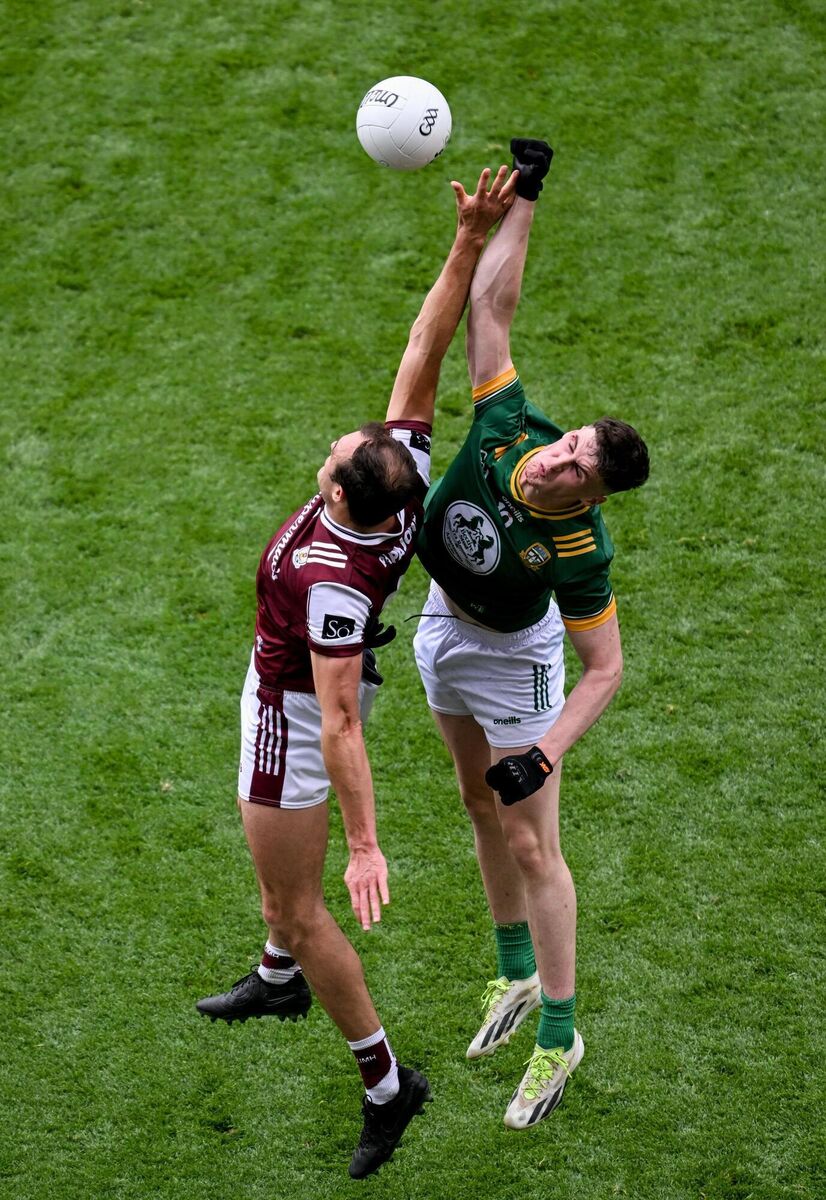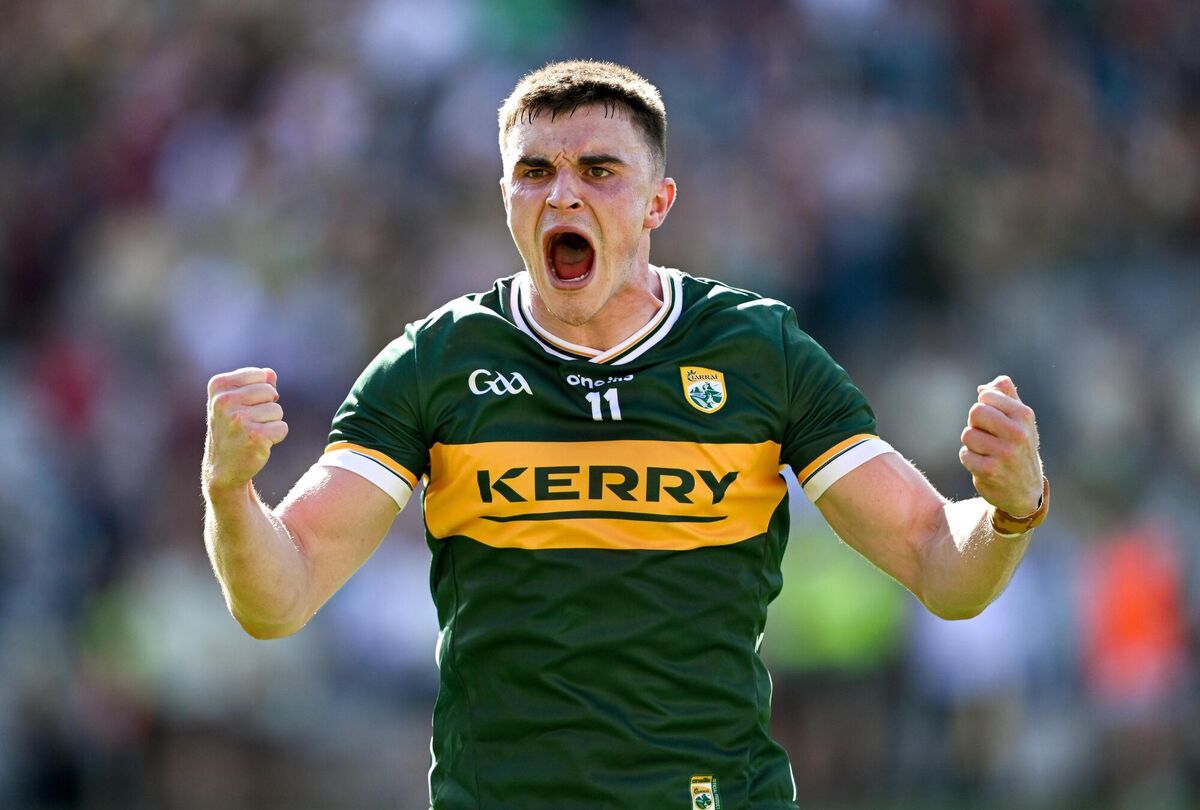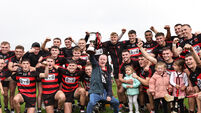Maurice Brosnan's football observations: In this game, kickouts can kill

Armagh's Andrew Murnin and Mark O'Shea of Kerry compete for the ball. Pic: Laszlo Geczo/Inpho
THE man in the arena. For Dessie Farrell, that’s what it’s always been about. After decades of dedicated service to his county, the two-time All-Ireland winner departed with his own presidential address.
Farrell had already confirmed his decision to step down before he arrived in the lower levels of Croke Park for the post-match press conference. His broadcast interview with GAA+ confirmed the news that his six years at the helm was at an end.
Not that those six seasons, which included the success of 2020 and 2023, should be defined by him. On this, he was adamant.
“It’s not (about me),” he stressed. “It always and always has been about the players. Ultimately, they are the men who step into the arena.”
Teddy Roosevelt likely didn’t realise that his legacy with labour rights or American conservation would be overshadowed in the sporting sphere. Athletes of all descriptions are fond of referencing his famous ‘Man in the Arena’ quote from his ‘Citizenship in the Republic’ speech.
One of the most enduring passages has become a constant reference for stars, from Lebron James to Tom Brady to Serena Williams.
“It is not the critic who counts; not the man who points out how the strong man stumbles, or where the doer of deeds could have done them better.
The credit belongs to the man who is actually in the arena, whose face is marred by dust and sweat and blood; who strives valiantly; who errs, who comes short again and again, because there is no effort without error and shortcoming; but who does actually strive to do the deeds…”
The cult of the manager isn’t a new phenomenon. Some thrive in its glow; others are denied the same grace. Farrell, inheriting a five-in-a-row-winning outfit and ultimately overseeing the last dance of 2023, should not have his role diminished. Someone still had to steer that ship, to steady the wheel when storms came, to lead them and prepare them to step into the arena.
Then it’s on them to execute. Jim McGuinness is a manager chasing Farrell’s record of two All-Irelands in six years. He has tried, and failed, to articulate the same player-first philosophy.
This was particularly apparent after the Ulster final when BBC report Mark Sidebottom concluded his interview with a final line: “Jimmy’s winning matches. Thank you.” McGuinness doubled back to interject. “No. That is wrong. It’s actually wrong,” he stressed with steely insistence.
“The players are winning matches and that’s something that gets lost. There’s too much about that, there’s too much about that.”
The cynical instinct in all of us can sometimes scoff at how Roosevelt’s speech has become something of a cliché in modern sport.
But to do so is to miss the reason it still resonates. It might not need to always be that exact reference, but the sentiment behind it should be repeated at every opportunity. Players across the board deserve immense credit for what they contributed last weekend.
There are men in various squads who put themselves through unimaginable physical or mental strain before taking to Croke Park. It should be acknowledged long before anyone reaches for dismissive descriptions like ‘hopeless’ or ‘useless.’ while the players step into the arena, several stakeholders contribute to its construction.
Managers shape the environment. Their job isn’t to hog the stage but to prepare others to walk out onto it.
Dare we say, even the critic has a role to play. Scrutiny, expectation, anticipation, the national conversation are what make the arena what it is. Thankfully, in recent weeks, it has been something special.
Here are eight observations from the Gaelic football championship.
In their post-game review, one figure will explain Armagh’s defeat above all others. 0-14 of Kerry’s 0-32 came directly from Ethan Rafferty’s kickout. A killer.
Sunday's quarter-final showcased a growing trend in emphatic fashion. In total, there were 19 kickouts lost (Kerry lost six of their own). The opposition scored directly from 17 of them. Pause on that...
There is no more fundamental aspect of the new game than a team’s own kickout. Rafferty only went long into the opposition’s half twice during Kerry’s ferocious second half spell. He continued to try, understandably, find a midrange target.
His ability to do so earned him deserved praise after the Ulster semi-final win over Tyrone when he retained every kickout bar one. Kerry’s ability to take that option away was the decisive tactical move of the tie.
The 40m arc has been a complete game-changer. In the 2024 championship, the vast majority of Kerry’s opponents conceded the kickout.
No one is resorting to that approach now. Getting hands on ball is so difficult that it has become the primary focus for coaches. Eventually, it will evolve so that teams factor in how to win the kickout while also ensuring they are defensively set.

Defensive shape on your own restart is already ingrained in hurling coaching. Paul Kinnerk and Derek McGrath led this development.
Very few teams in that code would resort to clearing out their own full-back line on their puckout or attempting to find a target in a zone where they are outnumbered. If you can’t win the battle, don’t lose the war because of it.
When it comes to the kickout, the evolution has only just begun.
When Armagh submitted their pen pics for the Ulster championship, their panel included 15 players aged 30 or over. That group included a number of stalwarts: Aidan Forker, Ciaran O’Hanlon, Connaire Mackin, Ethan Rafferty, Greg McCabe, James Morgan, Joe McElroy, Mark Shields, Niall Rowland, Niall Grimley, Paddy Burns, Rory Grugan, Stefan Campbell, Jemar Hall, Andrew Murnin.
Ulster champions Donegal had only five players aged 30 or over, a reflection of the fact this is a new team that McGuinness is building while the Armagh side is an echo of Kieran McGeeney’s long-term project.
Bright prospects like Oisin Conaty and Darragh McMullan are mainstays and will now benefit from a stint Stateside before they return to spearhead another silverware challenge in 2026. Others face a period of consideration. McGeeney stated he will take some time to consider his future.
“It is hard to know,” he said. "I sit down every year (to reflect) and my thing is always about players. It's all about the players first and foremost, and what they want and how much they want to push on.”
Some of those experienced players emerged late on Sunday evening to stand in the middle of Croke Park and embrace their team-mates. We will learn in due course what this means for the next chapter.
Heading into last weekend, Sean O’Shea had played eight games for Kerry in 2025. The Kenmare Shamrocks man is one of the sweetest strikers of the ball and took his tally to 0-21 on Sunday in an awesome, and rare, showing.
For the first time all year, O’Shea took a shot with his left foot. It came during that second half blitz and resulted in a two-pointer. In total, the number 11 had seven shots from play for 10 points. He also nailed two frees.
Per GAA Insights database, before last weekend O’Shea had taken 73 shots off his right and fisted another three efforts. It was clear from his post-match interview that the two-time All-Star was playing with a raging fire within him. That passion evidently had him in a perfect flow. It is a vital spark for the Kingdom and a warning sign for everyone else.

Speaking of sparks, Meath star Jordan Morris started his Sunday with three consecutive misses. At that point, the corner-forward had scored three points from his previous 11 shots. He clipped one score against Kerry in the Sam Maguire group stages and two against Roscommon.
One benefit of the new rules is that talents like Morris can rely on a steady supply. Morris finished the afternoon with 1-6. He forced the turnover that led to his own goal and could have had another when he pulled first time on a rolling ball, forcing a super save from Connor Gleeson.
In the aftermath of their preliminary quarter-final victory over Louth, Jim McGuinness was asked about the form of midfielder Michael Langan who was approaching the 100 game milestone for Donegal.
“Very elegant on the ball, can kick scores. I'm delighted to have him and delighted to have him going well,” he said. “Hopefully that means he can score a goal next week. Ciarán scored one this week. No pressure, Michael.”
Cue the ball into Michael Murphy, a quick step, a bounce to steady himself and a bullet into the top corner. Boom.
“I predicted it,” said McGuinness after their Monaghan triumph. “Did you back it? There you go. I told you it was going to happen! It was his 100th game. It always happens in their 100th game.”
It was then that he was informed goalkeeper Shaun Patton was due to make his 100th appearance in the semi-final. “That could be stretching it.”
After a disappointing performance and quarter-final exit, Pádraic Joyce confirmed he would take some time to reflect on his future.
“The county board have always been very supportive of me and the players so we will sit down and get things properly organised. Whatever will be will be. There will be no statements or no rushes coming out the next day or two anyway,” he said.
It would be a huge loss to Galway football if Joyce decides to step away. Despite a frustrating end to the season, his record remains impressive: it is four consecutive Connacht titles and two All-Ireland final appearances since taking charge. Crucially, he has evolved as a manager since his appointment in 2020, learning from setbacks and keeping Galway among the top contenders.
The group itself remains in a strong place, with a favourable age profile and no retirements since 2021. The challenge now is to regroup, inject some freshness and summon a collective resolve to bounce back stronger.
68.23: Shane Walsh kicks a two-pointer to cut the margin between Galway and Meath to one.
68.49: Billy Hogan takes the kickout after a brief delay to clarify the shot was outside the arc. Despite that, Galway do not get their press right and Hogan gets it away to the corner.
69.05: Donal Keogan wins a free and stays down.
69.25: Meath take the free.
69.36: Costello wins possession and another free.
69.57: Captain Eoghan Freyne comes across and takes his time. Eventually, he kicks the free harmlessly wide. The hooter went before Connor Gleeson took the kickout to himself. Perhaps they could have kicked the ball into the back row of the Hogan Stand to absolutely ensure Galway didn’t get one more chance, but overall Meath managed the end game expertly.
There are many things this writer does not understand within the GAA. As a member of the Kerry backroom team was keen to point out underneath the Hogan Stand after their awesome display, there are many things we are wrong about within the GAA.
Is the practice of naming selectors one of them? We were delighted to see no team last weekend opt to list their ‘manager’ and ‘selectors’ in the matchday programme. Only one, Donegal, opted for ‘roghnoiri’ in their social media team announcements.
The practice of listing selectors remains a mystery to me.
What purpose does a selector have? If they are a coach on the field, why not name what they do? If they are purely there to watch and give an opinion, what manager needs that sort of assistance?
Does Andy Reid or Pep Guardiola have selectors? Is high level sport not about having clearly defined roles that serve a value?
The selector may have been necessary when county setups were fractured with squabbles over what part of the county was represented. Does that still happen?





